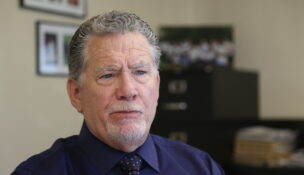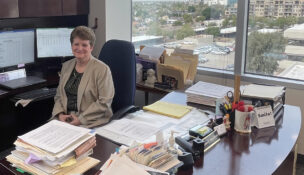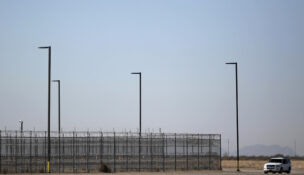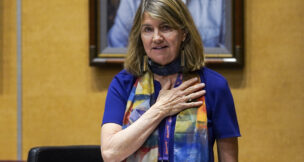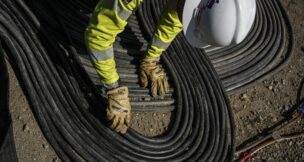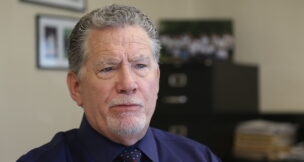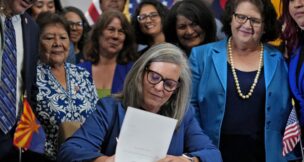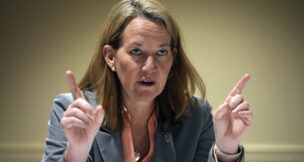Autumn Johnson: Fighting for solar in the sunniest state
Reagan Priest Arizona Capitol Times//August 17, 2025//
Autumn Johnson: Fighting for solar in the sunniest state
Reagan Priest Arizona Capitol Times//August 17, 2025//
Autumn Johnson, an attorney and executive director of the Arizona Solar Energy Industries Association, says she has a “challenge accepted” personality. It serves her well in her role advocating for solar energy at the Arizona Corporation Commission and other public bodies.
How did you end up in solar advocacy?
I was a social worker after graduating from college before attending law school, and I wasn’t sure what I wanted to study law for. I always had a public interest focus, but I saw that documentary An Inconvenient Truth before I went to law school, and so I decided to focus on environmental law. Then, when I got out of law school, it was the Great Recession, and so it was not an ideal time to be trying to get a job in the environmental law sector. I moved back to Idaho to pursue a PhD in public policy at the time, and I didn’t want to pay tuition, so I applied to the Energy Policy Institute. And I’ve been in energy ever since. I like to tell people that once you’re in, you’re in. Once you get your foot in the door, there’s just so much opportunity and so many different ways you can go. I wasn’t planning to move here. I was planning to move to New Mexico, but I got a job offer here to work in energy policy specifically, and I got into solar after that, because the executive director of AriSEIA happened to be leaving and so they just asked me if I would do it.
What has kept you in the energy and solar policy areas?
What I used to tell people was that I thought energy was just the right amount of interesting — but it also doesn’t keep you up at night. There are some topics for which I feel like I would be so passionate about that I wouldn’t be able to turn off at all. It used to be (that) energy was something that was very intellectually stimulating, very important — but it wasn’t like, you’re gonna burst into tears over something that happens in energy. Because there is sort of an intellectual component to it that’s like, this is a mathematical problem that we can solve. That has changed, I think, more as of late, and it really has become a little bit more of a personal imperative because of how much backtracking has happened and also because of the immediate impact on people’s lives. Every time you hear one of those stories about someone’s power getting shut off and then them dying, it’s just a wake up call that these are real people’s lives that we’re dealing with here. It becomes a lot heavier when you think about it from the weight of the responsibility.
The political environment has been particularly rough for solar this year. What has that been like in Arizona?
I think Arizona just can’t get out of its own way most of the time. It makes no sense for the sunniest state in the country to constantly be putting itself at a disadvantage when it comes to solar. We constantly put up barriers and make it harder within the state. That’s not a new concept, that’s been going on for some amount of years. I always tell people it’s hard to work in solar in the sunniest state in the country. It’s like if we’re LeBron James and we decide we’re gonna play with one hand. We should use all of the resources available to us to benefit both our economy and our grid to the greatest extent possible, and we don’t. From the federal level, the last six to eight months, I don’t even have words to describe how nonsensical it is. I don’t understand what the endgame is, because even if you believe it’s just entrenchment of fossil fuels, all those fossil fuel companies own renewables companies. So it just doesn’t make any sense to be like, let’s make the least expensive technology that’s the fastest to deploy, the hardest to build. It makes no sense from an economic development standpoint. It makes no sense from a grid resiliency standpoint, and it doesn’t make any sense from a people being able to pay their electric bills standpoint. So I am at a complete loss for what the strategy is here. Between the executive orders, the tariffs and the budget reconciliation, it’s just one thing after another. Almost every day it’s like, what fresh hell is this?
What is solar advocacy like at the Arizona Corporation Commission?
Corp Comm is a trickier situation in some ways. The utilities have an extreme amount of influence in both (the ACC and the Legislature), but in different ways, and how they choose to exercise it is different. So you end up in a situation where, for the most part, APS gets its way no matter what. There is, sometimes, a little bit of friction or static, depending on if APS wants something that’s different than what the MAGA base wants. For the most part, APS is one of the most influential players in the state. And certainly, when it comes to residential or distributed solar, they have historically been very antagonistic. And that has shown up over and over again at the Corp Comm. Corp Comm has been saying for the last few years that they’re for an all-of-the-above approach and that they’re not doing anything to directly impede renewables. That is maybe technically correct to an extent. They are acknowledging integrated resource plans of the utilities that call for building a lot of renewables. They are not blocking the line, citing approvals for certificates of environmental compatibility for renewables projects. They’re not disallowing the capital costs for these projects in rate cases. But what you do see is a lot of rhetoric that I think is dog whistling, anti-utility scale renewables work at the same time. So you see press releases that come out that say, “Well, we’re for an all of the above approach. We also really support Trump’s energy agenda,” which has been completely anti-renewable. Or you see things saying, “We’re for an all of the above approach, but we don’t think they should have any subsidies.” I think that there is a catch-22 there, and a little bit of talking out of both sides of your mouth in that situation. Some of that is like an unfortunate political game that we’re all stuck in, that is not of their own making.
What do you wish ratepayers knew about solar and utilities?
Electricity is one of those things where it’s on in the background. You never think about your hot water heater until it breaks. It’s just a passive thing, like white noise in the background, and that’s what electricity is for most people. Until you get a bill that’s $600 or your power gets shut off or there’s an outage because there’s a big storm, you’re not even thinking about it. I think that’s slowly changing right now. But for the most part, people don’t want to think about their utility. They don’t want to look at the 800 lines on their bill for different adjusters, and nobody knows what they mean, they just pay it. So I wish people knew, to some extent, how the sausage is made. What is the Corp Comm? What do they do? How does it affect you? How are they elected? How are the utilities making these decisions? I think people would be really surprised where most of their power comes from. I think people just think that we’re marching toward — more clean energy, and coal is probably bad, but we’re not using that anymore anyway. I think most people would be very surprised to learn that utilities are all monopolies. You can’t leave, you can’t pick them. They get a guaranteed rate of return. I think people would be surprised to know that regulators of energy are not usually elected, that it’s unusual that they’re elected in Arizona. You don’t have to have any kind of energy or water qualifications to run. There’s really not a lot of separation between the utilities directly influencing what their regulators are doing.
Do you see a future where Arizona gets out of its own way on solar?
There’s for sure gonna be a future for solar. There has to be, because there are only so many choices. So when you’re comparing what can you build with what can you afford to build with what can actually meet the demand, it’s a real short list of stuff. I think we are posturing a lot right now, and we’re making it really hard for ourselves, and we’re gonna make it more expensive to basically do the same things. (Coal) is going to get less and less and less economical and people aren’t going to want to pay for it and there’s going to be cheaper options. We’re going to build more renewables, and we’re going to close coal, and that’s likely going to happen over the next decade. I think gas and nuclear are a little bit trickier conversations. Maybe we will eventually have new nuclear. I’m not opposed to that. I’m all for anything that is clean as far as carbon emissions go, or other air emissions. But that is a really expensive proposition. I am disappointed at our insistence on doubling down on gas. I think it’s shortsighted; we’re just slapping Band-Aids on things right now, and we should be suturing. So I am generally optimistic over the long term that we are going to actually do the right thing that both makes sense and is actually good for our community and the environment and our kids.







